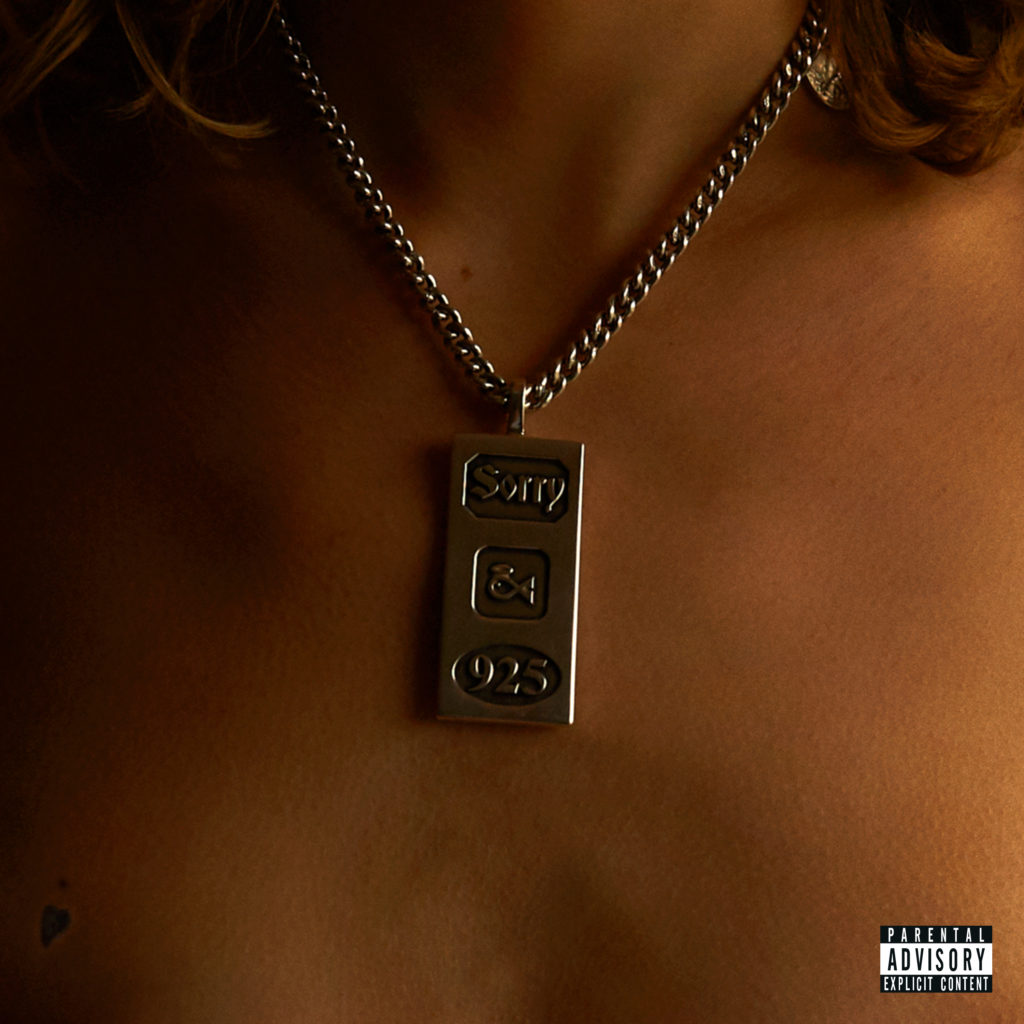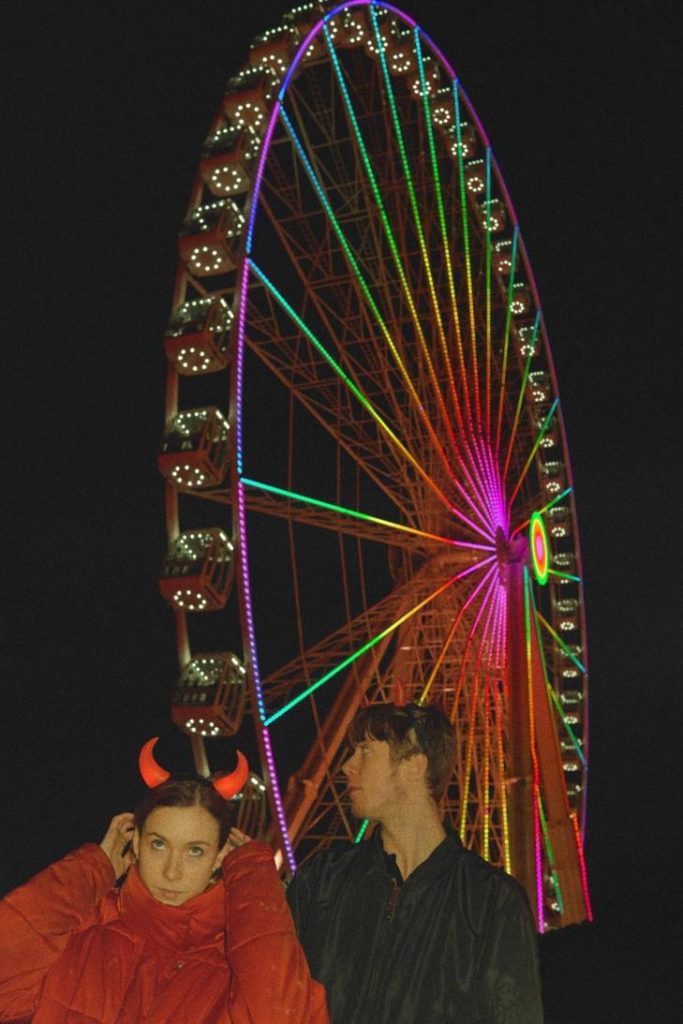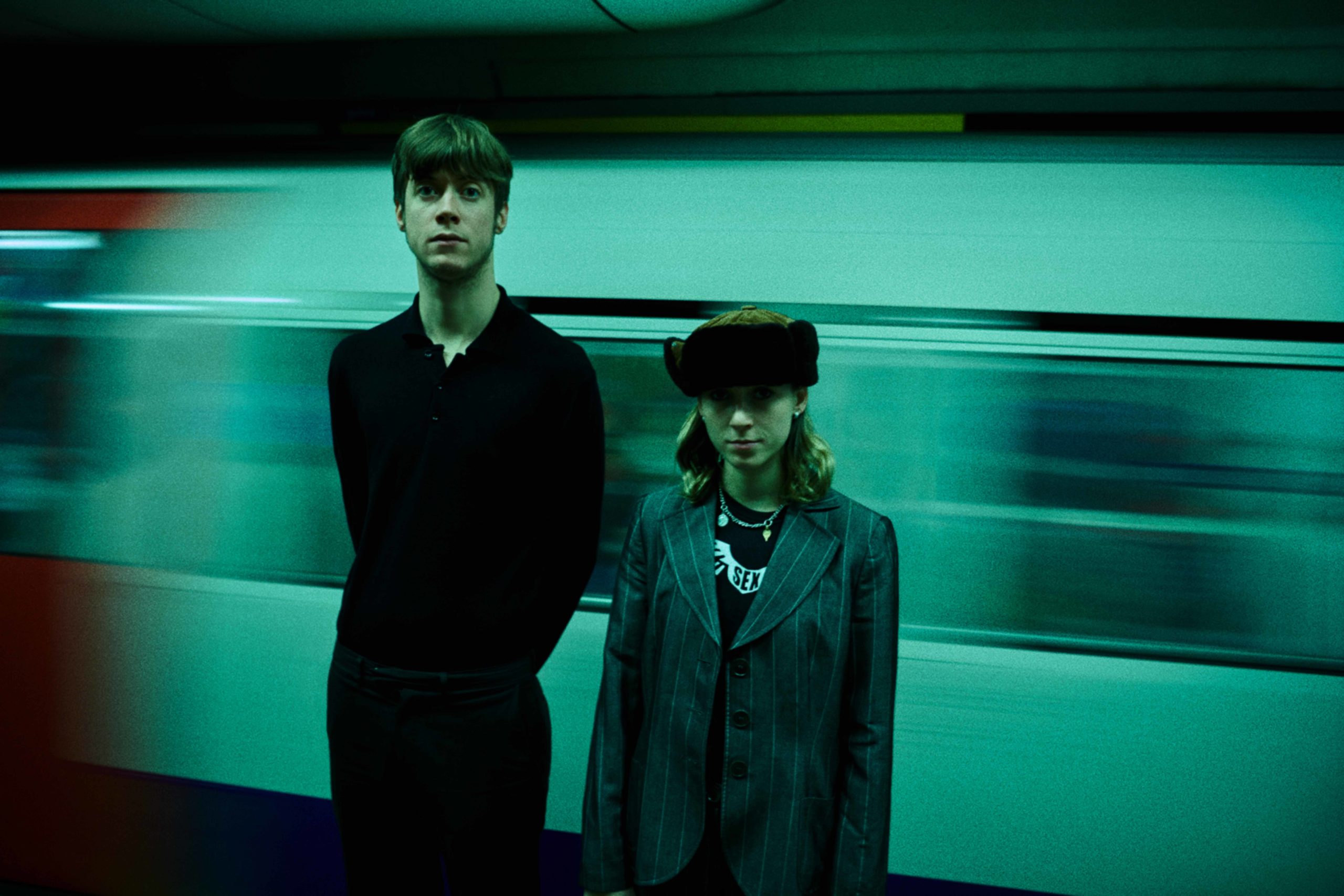Foto-© Sam Hiscox
Nun starten sie doch mit einem Album durch. Endlich, möchte man sagen. Aber Asha Lorenz und Louis O‘Bryen wussten immer, dass man nicht den alten Weg gehen muss. Man darf sich mit Mixtapes und unzähligen Singles auch eine Probierphase gönnen. Die haben sie zu Hause im Norden Londons in aller Ausgiebigkeit am Computer genossen. Klar, ab und zu sind sie schon rausgegangen, als das – man erinnere sich – noch problemlos möglich war. Dann haben sie zum Beispiel im Windmill-Pub in Brixton gespelt, so wie es auch Shame, Goat Girl, HMLTD und viele andere getan haben. Außerdem waren sie mit der Fat White Family und Sunflower Bean unterwegs.
Musikalisch unterscheiden sich Sorry von den anderen. Indie-Rock spielt bei ihnen fraglos eine Rolle, gerne mit etwas Grunge-Grimm versetzt. Los geht‘s mit Nirvana und Lush, auch Blood Red Shoes oder Courtney Barnett spielen hinein. Sorry lieben auch die Verquickung mit der elektronischen Seite des Geschäfts, weshalb man tatsächlich an Garbage denken darf. Inhaltlich geht es nicht zahm zu, gerade in More nicht, da spielt das teuflische Ding namens Droge hinein: „I might stumble, I might vomit, party in my pocket.“ Heather hat mehr mit Folk zu tun und in Wolf huscht auch mal ein Anflug von Metronomy durch. Geil ist letztendlich, was Asha und Louis daraus machen. Jeder Song sitzt, groovt und enthusiasmiert mit Melodiegefühl. Der Wertigkeit des Ganzen sind sich die beiden sehr wohl bewusst – der Albumtitel 925 bezieht sich nicht nur auf die tägliche Arbeitsroutine, auf das Nine-to-Five, sondern auch auf den reinen Silbergehalt von 92,5 % in Sterling-Legierungen. Precious little things.
Zur Band gehören auch Bassist Campbell Baum und Drummer Lincoln Barrett. Sie spielen regelmäßig in der Live-Band, dürfen aber nicht an den Interviews teilnehmen. Asha und Louis sind die Gründungsmitglieder, schreiben die Songs und stellen sich dann manchmal missmutig den Fragen. Ein bisschen erfährt man von ihnen aber doch, keine Sorge.

How did it all start?
Asha: We went to school together and both played guitar with other people. We were making music separately, and then we thought we could also try to do it together.
Louis: We both used to make songs on the computer at home and uploaded them onto Soundcloud. It made a lot of sense right from the start. We really liked the music we were making.
What have been the influences at that time?
Louis: I used to listen to a lot of hip hop from 14 to 16. Before that I listened to rock music like The Strokes and Elliott Smith and stuff. Then I liked hip hop for a bit and then went back to rock music.
Asha: I liked Nirvana a lot when I was young. Nevermind was a bit of a life changer. I also liked jazz quite a bit. Those are the classics for me.
The jazz leaning comes through in As The Sun Sets with a hint at Louis Armstrong.
Louis: The song used to be called Wonderful World, but we had to change it in case Louis Armstrong tried to sue us (laughs). Asha wrote the original lyric and then we thought it would be funny to incorporate Louis Armstrong a litte bit. We sampled the choir singing it.

When you listen to veterans like Louis Armstrong or Tony Bennett, what kind of impression do you get? How does you compare it to newer stuff being made?
Asha: I actually don‘t listen to new music that much, I listen to old music a lot more. It‘s more emotive and the songs are often more romantic and not artificial or hollow. When Louis Armstrong sings about his wonderful world, you know exactly what he means. When Tony Bennett sings about San Francisco, you can feel a connection to the place. But don‘t get me wrong: There are also some more modern artists that still make me feel something, like (Sandy) Alex G…
Louis: …or Aldous Harding. Also I don‘t think, if Louis Armstrong was around now, he‘d record music on a computer.
Asha: It just a different way to compose nowadays. It‘s not like we just make it on the computer, it‘s just a nice thing cause it means that more people can just write music for fun as well. Good people will still get found out, but it also means that more people can play around with electronic devices at home.
How do you summarize the whole album you‘ve made, what kind of journey is it for you?
Louis: I think it‘s a journey of exploring what different types of music we can dip our toes into, what music we enjoy making and what music sounds fresh to us and exciting.
Asha: It‘s quite a youthful album as well, based on the experience of a girl growing up and trying to work things out a bit.
You two are quite friendly and calm in conversation. On the record you‘re singing about drugs, drugs, drugs and rock‘n‘roll stars. What‘s going through your mind when you‘re thinking about more extreme matters?
Asha: We‘re creating different personas and making songs like that. There are different aspects to our personality….
Louis: …yeah, we can definitely be quite chaotic. We can get angry at each other or at the world maybe. We can get a certain energy out of that.
Asha: For us it‘s more about emotions and relationships rather than the world, but current news obviously also have an impact. It‘s more of a coming together of different inspirations, but it‘s not pinpointed to one thing, it‘s more abstract.
Is the band name your form of apology for Brexit?
Louis: (laughs) No, Brexit wasn‘t our fault. People should be apologizing to the young people in Britain for Brexit. They younger people in the country didn‘t vote for Brexit, it was mainly older people.

A lot of younger people didn‘t vote at all in 2016 unfortunately.
Asha: People got misinformed and didn‘t realize what was going on. It‘s not their fault, it‘s more to do with the media swaying how people think about it.
Louis: The whole Tory campaign was based on the lie basically. It‘s awful that people don‘t vote but that‘s just youth being disenfranchised. There‘s a lot of lies involved. We really do feel sorry to the rest of Europe, but it‘s not really our fault.
Do you already feel that Brexit has impact financially on a band?
Louis: We‘ve been in the band for so long that it‘ll be silly to let it bog us down now. But if I was starting a band now, if I was starting at the ground, it sure would feel different. And London‘s such a different place to the rest of the UK. The atmosphere in town is not apocalyptic, but there‘s a lot of desperation. The divide between London and the north is very strong, it‘s quite shocking really.
Why is Sorry the right word for the band‘s name for you?
Asha: You have to pick a name eventually, and if it‘s also a bit funny, why not? It just worked.
Louis: We‘re definitely trying to provide like an escape from that constant influence of politics that you read about all the day in the newspapers in England. I feel it‘s nice to be able to give you something that takes you to a different world. A bit like: Sorry about the way it is, let‘s go somewhere else instead.
The album starts with Right Around The Clock. In that song you make an allusion to the Tears For Fears hit Mad World. Why do you point towards this band?
Louis: We like Tears For Fears, our bassist Campbell in particular. He loves them so much, he always wants to listen to them on the van. Going into that song, we wanted to write a big pop song that sounds like it was done by Tears For Fears. That‘s where the idea to put that lyric in came from. We changed the words, but the original writer Roland Orzabal is credited in that song.

We also have to talk about Starstruck a bit. It‘s a great track with personality thanks to the use of a burping noise.
Louis: Asha aways makes sounds like that, you can probably listen to some of them if you listen to this interview. She‘s a walking talking soundboard. (she laughs)
Asha: I just thought it suited the lyric, so we‘ve put it in and it became quite hooky. Don‘t know why people like it so much….
Louis: That also comes from me and Asha messing around in the first stages of writing the song when we‘re just recording on a computer…
Asha: (makes a noise and bangs her chest) Sorry, I‘ve got chest hurt…
Yeah, another sound…I‘ve got it on tape!
Asha: (laughs)
Louis: (a bit more serious) That‘s what we really like a lot. We‘re able to be a bit silly and have fun with it. Lyrically Starstruck could be about a celebrity or someone you hold in high regard in your personal life. It‘s up to interpretation.
You have released Starstruck and other songs on mixtapes and singles for years. Not every musician likes such a long forerun. Please explain why you do.
Asha: We had lots of songs and loved working on them, but we didn‘t want to release them on an album first. It‘s a way to put music out as an unknown band. We wanted to create a bit of an identity and get people excited an create a different world for them to get lost in.
Louis: We wanted to keep people interested by giving them songs. But we also wanted to make sure that the way we recorded the album was exactly right and all the songs were sitting right next to each other. We hope we‘ve found a coherent entity that links all the songs. We‘re happy with the result, we hope people are too.










